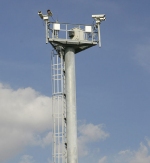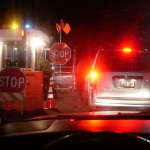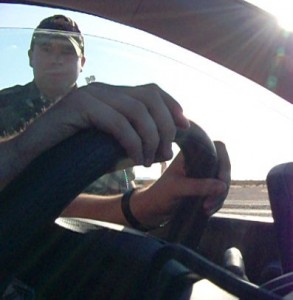 It’s one of the first phrases we learned in 7th grade Latin class, and it sums up the fundamental conflict facing the world.
It’s one of the first phrases we learned in 7th grade Latin class, and it sums up the fundamental conflict facing the world.
Paul and I were recently in Arizona for one of his astronomy conferences. (Ironically, it’s a cheap state to vacation in, since it’s desperate to recoup tourism losses due to boycotting over recent police-related civil rights issues.) Since we had an afternoon free, we decided to drive up to Kitt Peak to have a look at the telescopes and the view. We didn’t go blindly; we were well aware that the road to Kitt Peak has been the site of numerous law enforcement injustices; police abuse a loophole to pull people over illegally on and near Tohono O’odham reservation land and harass the heck out of them. Because it affects nearly every astronomer who uses Kitt Peak Observatory, it’s made waves in academic circles.
On the way there we saw the first of the checkpoints going the other way — a barricade that forced every car to stop so that its occupants could be interrogated. That’s when we made up our minds to not cooperate on the way back. We were still feeling a bit disgruntled from our move to California last year, when we agreed to allow agents from the Department of Agriculture to inspect our U-Haul at 3am just to keep moving (just like these folks — and don’t think these agents don’t try to take advantage of your desire to “keep moving”). But that day we had all the time in the world. So on our way back, we pulled up to the checkpoint, followed every rule, and embraced our right to stay silent.
 The first thing border patrol agents (BPA?) do is get you talking. They don’t always start in with the question they want to ask. They’ll ask how you’re doing, where you’re headed, where you’re coming from. Maybe they’re even trained to detect lies, but since the ones we encountered later weren’t even trained to know the laws they were meant to enforce, I rather doubt it. The guy who stopped us had his hand on his (very large) gun — everyone was armed to the teeth and intimidating (even the blinking lights and stop signs and orange barricades are meant to scare people into complicity, and it works). There were more agents off to the right side of the road, and another one behind us, who, we quickly realized, was the boss, given the way the one who stopped us kept looking back at him for approval.
The first thing border patrol agents (BPA?) do is get you talking. They don’t always start in with the question they want to ask. They’ll ask how you’re doing, where you’re headed, where you’re coming from. Maybe they’re even trained to detect lies, but since the ones we encountered later weren’t even trained to know the laws they were meant to enforce, I rather doubt it. The guy who stopped us had his hand on his (very large) gun — everyone was armed to the teeth and intimidating (even the blinking lights and stop signs and orange barricades are meant to scare people into complicity, and it works). There were more agents off to the right side of the road, and another one behind us, who, we quickly realized, was the boss, given the way the one who stopped us kept looking back at him for approval.
But we had already decided we weren’t answering questions. See, the (shockingly racist) Martinez-Fuerte supreme court decision from the 1970s gives the feds the right to set up immigration checkpoints within 100 miles of our borders, but the constitution protects our right not to answer questions. In fact, the only things we are obligated to supply are our names (something we were never asked). US citizens are not legally obligated to tell anyone (including border patrol) that they’re US citizens, unless they’re trying to get through customs at the actual border. Tucson ain’t the border. Granted, if you’re not an American citizen, you do have to say so, and you do have to produce documentation (and legal immigrants are frequently victims of abuse at these checkpoints). US citizens, however, can stay silent. Moreover, failure to answer polite questions is expressly rejected as articulable cause for detention.
Our guy seemed well aware of that, so when Paul politely said, “We’re not answering any questions today; am I being detained or am I free to go?” he began the stalling techniques I assume are stock procedure. They can’t tell you they’re detaining you because they have no probable cause to detain you. And yet they don’t want to tell you you’re free to go either, because you didn’t answer their questions (and nothing provokes a cop like sticking up for your rights). They can’t keep you for more than a few minutes without it becoming detention, so they have a few minutes to play mindgames. So he kept refusing to answer the detained-or-free-to-go question. When polite requests didn’t work, he tried insisting he was legally obligated to attempt to ascertain whether we were transporting any illegals (which is true) but the implication was that we were obligated to answer (not true). He tried bypassing Paul and got the same response from me, which visibly annoyed him. At one point he said that no, we were detaining ourselves, at which time Paul said that if that were so, we hereby rescinded our detention and would consider ourselves free to go. The agent requested several times that we pull over into “secondary,” though when Paul pressed him each time on whether that was an order, he refused to agree that it was, meaning we weren’t legally obligated to follow it. Of course, he couldn’t order it — he had no probable cause to do so. (More on “secondary” abuse later.)
After a few minutes of back-and-forth, the BPA in the back used another tactic I eventually realized was stock procedure — he raised his voice and started shouting very angrily that we were “blocking traffic.” I assume that a lot of people get rattled by that, thinking that they might be cited on those grounds. It didn’t rattle us. Paul pointed out that we were being held against our will and that the agents were the ones holding up traffic. Finally, our BPA looked back at bossman behind us, shook his head, stepped back, and mumbled, “Get outta here.”
In a way I felt sorry for the guy. He was just doing his job, and it’s a shitty job, out in the Arizona sun in August. But we were just trying to drive on a road and stick up for our rights, and the sneaky way they applied cop psychology 101 to try to trick and bully and scare us into giving up our rights stripped away my pity.
The following day, we were headed across the bottom of the state, on a tour of some parks along the way back to California, including Organ Pipe Cactus NM. It’s pretty post-apocalyptic in that area anyway, but the dozens upon dozens of BPA cars down there make it feel even more like the proverbial police state. We saw many more of their SUVs and trucks than we did real people, and there was an entire town (Ajo) that seemed to have more BPA and BPA cars than actual residents.
We also saw another checkpoint, this one coming right out of said park. This time, we were prepared. I had my phone out to record. And we knew their tricks. We have a new CR-V with California plates. We’re in our early 30s. We look white. We have Ohio accents. We speak well, know the law, and dress nicely. We had no drugs, and we weren’t impaired. My brother is Army Military Police; he has a degree in criminal justice and so does my mother! Half of Paul’s family are lawyers. These things shouldn’t matter, but we know full well that they do. We were the perfect test case. I think we honestly figured it would go the same way as the one near Kitt Peak.
It didn’t. The agents at the Ajo checkpoint either didn’t understand the law or were lying deliberately (either one is reprehensible). We went through the same routine. We’re not answering any questions today; are we being detained or are we free to go. The first guy argued with us, refused to tell us we were being detained or that we could go, and kept insisting that Martinez-Fuerte mandated that we have to answer his citizenship question (it does not). After a minute or two, the two men off to the right of the car came around to the left side with a dog; they then proceeded to peer into our rear windows and allow the dog to sniff at us. After a few more minutes, a guy in the back pulled the same trick as the guys near Kitt Peak: “You’re blocking traffic!” I was holding up my phone to make sure I caught it all, and one of the agents shouted at me that he knew we were only doing this to “post up propaganda on the web.”
No, sir — I was doing it to protect my rights, since you clearly had no interest in doing so. Posting it to the web afterwards to educate others would have just been gravy. (Sadly, my recording is too faint to hear, so you’re stuck with this post. But he didn’t know that. And from those comments, it was pretty clear that they thought we were a couple of upstart yuppies who deserved to be screwed with.)
Finally, the first guy shocked us both when — I think as a result of his own frustration, not ours — he answered Paul and yelled that yes, we were being detained, and yes, he was ordering us into secondary. When we asked on what grounds we were being detained, he informed us he didn’t need cause to detain us. We were speechless. Here were three border patrol agents flagrantly breaking the law they were assigned to uphold. Of course, we weren’t about to disobey a direct order, however illegal and baseless it was (we’ve seen how badly that can go, and I didn’t really want to spend the next few years fighting for my right not to be beaten to a pulp by the police for the heinous crime of “sassing” them), so we pulled over and started the real video camera rolling.
Here’s where I should stop and explain what “secondary” is. Our reading of Martinez-Fuerte informs us that the supreme court has defined a “primary” inspection as a glance through the windows with no questioning, and a “secondary” inspection as basic questioning. It expressly states that nothing more than this is allowed without articulable probable cause. It became clear to us that in Arizona, agents are instructed to skip primary altogether and instead go straight to a mandatory secondary-level inspection at the first stop, and then to create a third level of inspection off to the side of the road, which they cleverly call “secondary.” I’d be curious to know whether anyone’s taken them to court over their creative, unconstitutional reinterpretation of the ruling. (I do know a great many citizens from both parties in Arizona are pretty fed up with having to submit to these checkpoints when out getting groceries; some have even gone so far as civil disobedience at the permanent stations.)
 So there we were, being detained without cause in what I can only describe as a tertiary off-road area. They clearly didn’t think we were much of a threat, as they sent no one over to guard us or block our way like many highway patrolmen at normal roadside stops do (we could easily have driven off). They never asked for our names or our identification; I assume they ran our plates. After eight minutes, the shouty guy (presumably the officer in charge, not the first guy), came over to us, and in a very low voice said, “You’re free to go” — implying, of course, that we were not previously free to go. (That, we did get on camera… He doesn’t look very happy about that camera, does he?)
So there we were, being detained without cause in what I can only describe as a tertiary off-road area. They clearly didn’t think we were much of a threat, as they sent no one over to guard us or block our way like many highway patrolmen at normal roadside stops do (we could easily have driven off). They never asked for our names or our identification; I assume they ran our plates. After eight minutes, the shouty guy (presumably the officer in charge, not the first guy), came over to us, and in a very low voice said, “You’re free to go” — implying, of course, that we were not previously free to go. (That, we did get on camera… He doesn’t look very happy about that camera, does he?)
Sadly, our story is only one among many.
We encountered several more checkpoints on our trip — one at the border between Arizona and California, and two more inside California. None of the agents at those checkpoints asked any questions at all (not even the usual “have you any fruit” question). One peeked in our vehicle and waved us on, wordless. Those stops were in stark contrast to the stops in Arizona, and they all seemed to adhere strictly to the definition of a primary inspection as defined by the courts.
The lesson here? Stick up for your rights. Follow direct orders, but politely decline requests. Do not answer questions except for your name. Do not submit to searches. Do not comply with field sobriety tests. If you live in the Southwest (or anywhere within 100 miles of any of our borders, including maritime borders), install a dashboard camera. Know the laws specific to your state and any state you drive through. You’re under no legal or moral obligation to make any agent’s job easier, and your disobedience will help everyone if it teaches even one errant cop.
Paul and I have long believed that our immigration policy is crummy and racist and nativist as well as economically unsound, and we both would prefer a policy that allowed everyone to come to the US to make his own way in the world, without having to jump through hoops set up specifically by our government to keep certain ethnic groups out. Most illegals have no interest in abusing our system and would gladly come here the right way if it didn’t take a zillion years to do so. Then Homeland and INS could stop wasting their time and our money harassing and abusing citizens (and wannabe-citizens) and get back to their supposed business of stopping terrorism. As it is right now, these agents are defiling the constitution and creating conflict with law-abiding citizens, whilst catching no one of consequence at all.
But this isn’t an immigration or terrorism issue, except in that it deters neither illegal immigration nor terrorism. This issue is about your own civil rights on American soil, and both political parties are actively making the situation worse. It’s about who’s watching the watchers. Red or blue, this affects you.